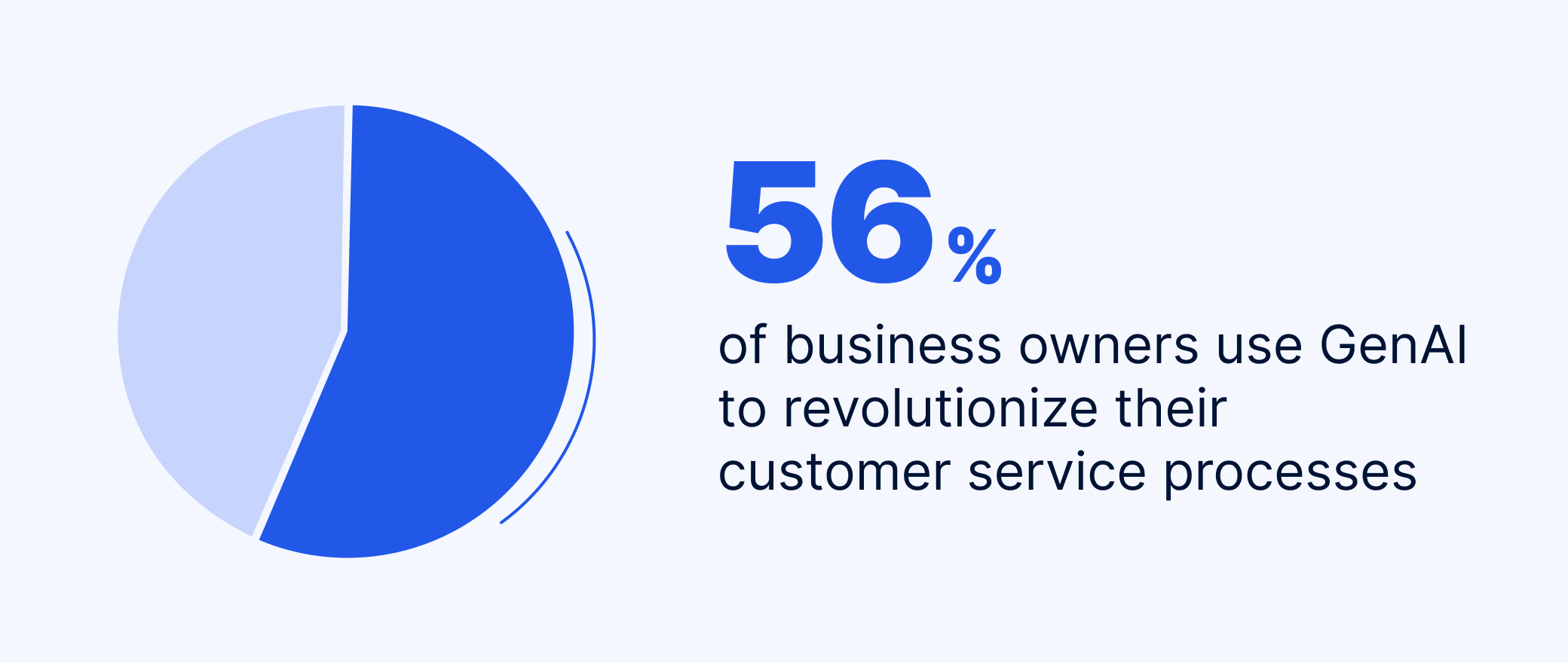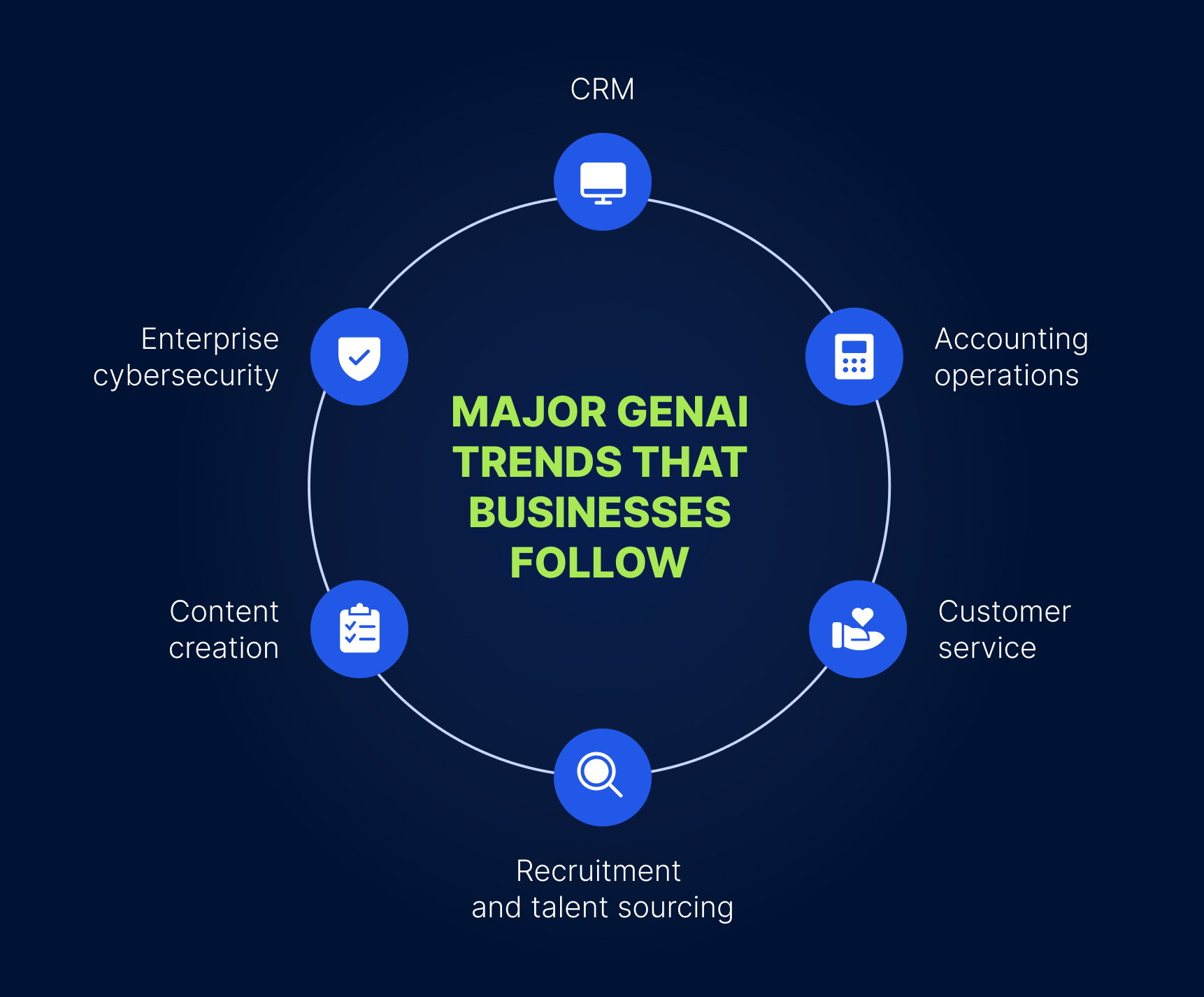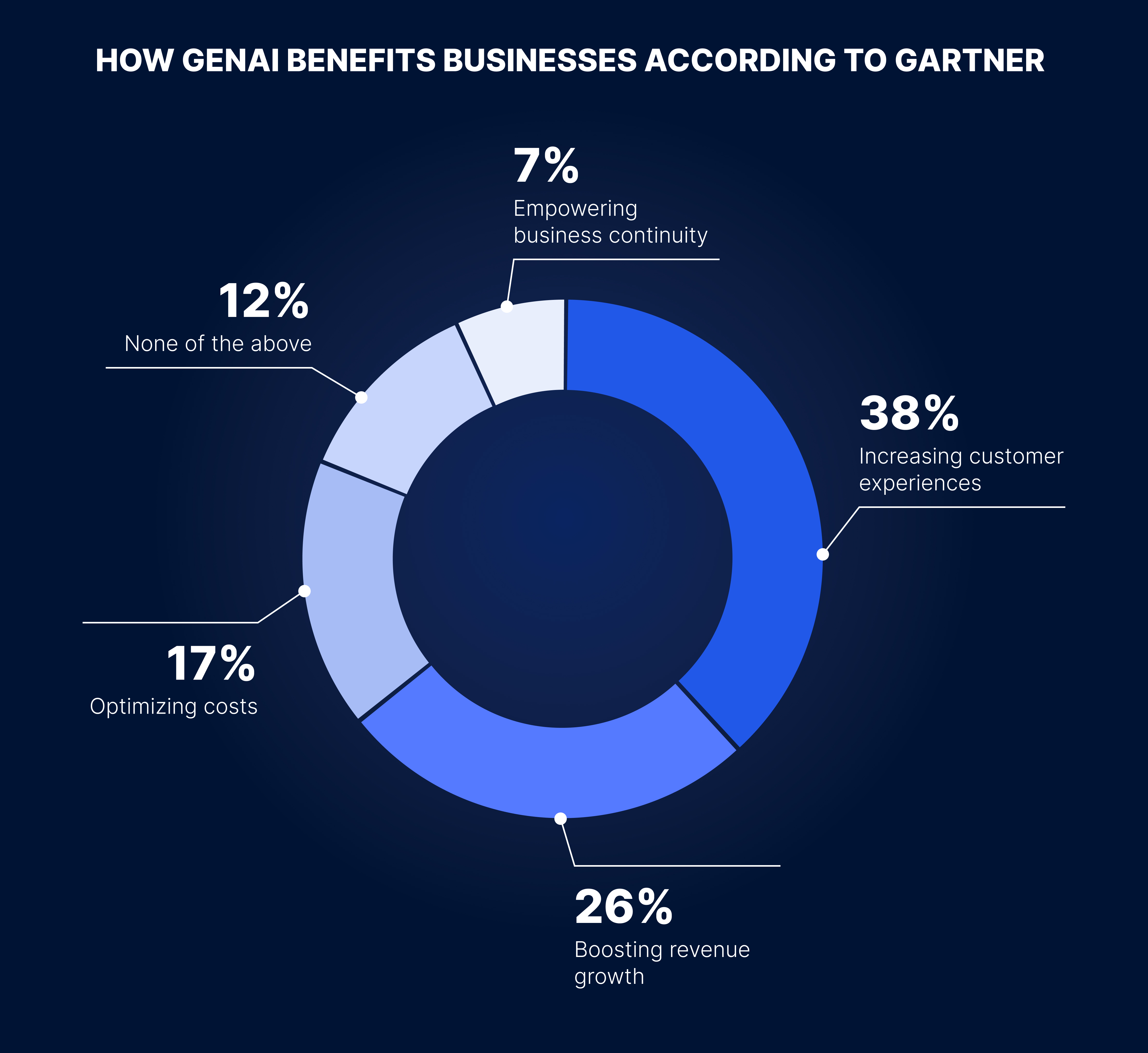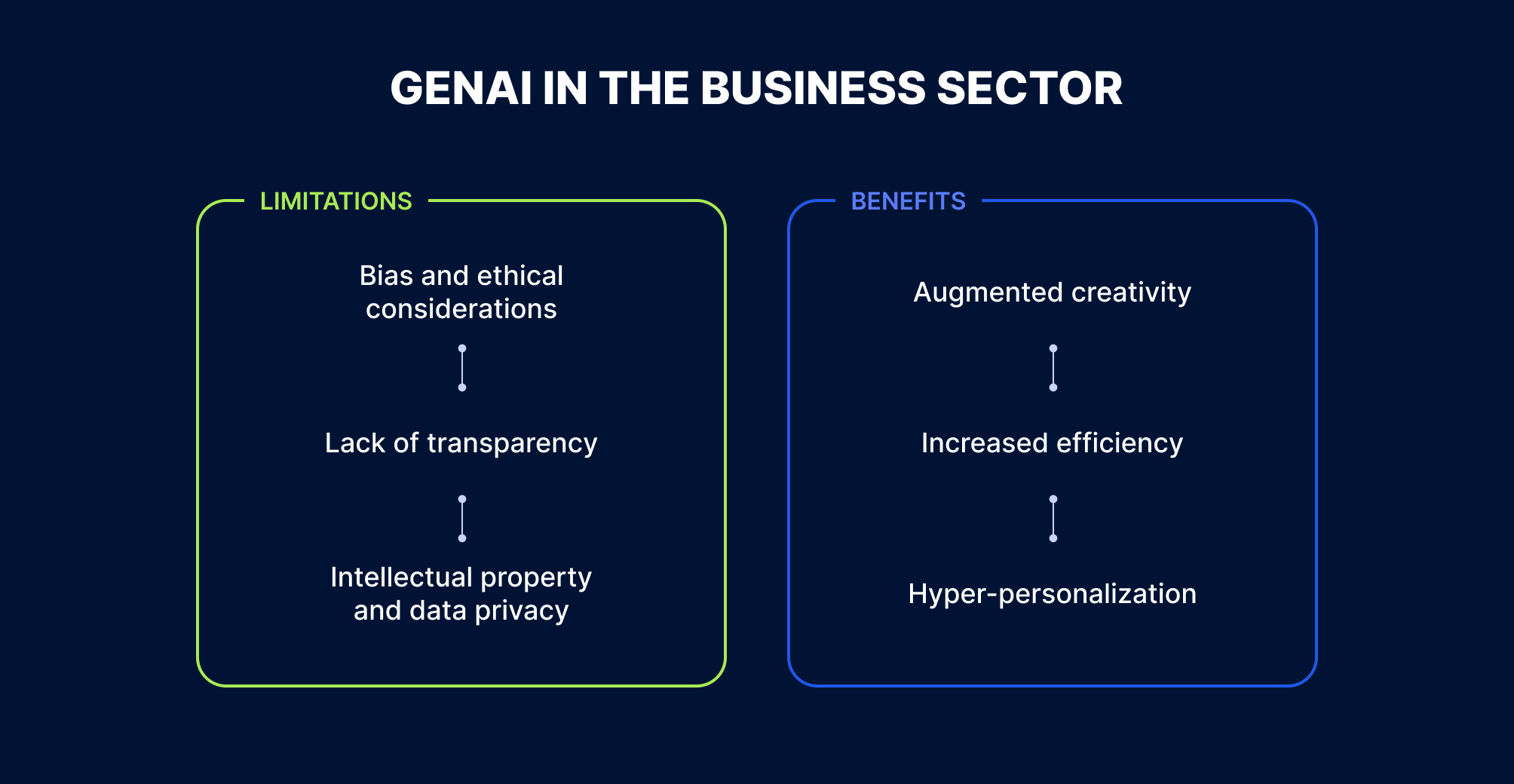
Contact us
Our team would love to hear from you.

With the introduction and increasing popularity of ChatGPT, generative AI, or GenAI, has become a buzzword, creating waves of both widespread admiration and sheer antagonism. Despite facing some negativity, GenAI tools are genuine game-changers in many facets of our lives, including business.
This article delves into the essentials of generative AI in business, explores recent trends in implementing this technology into business processes, highlights industry-specific generative AI applications, and investigates the limitations and advantages associated with GenAI in the business realm.
Generative AI is an emerging technology based on several types of AI, including machine learning (ML), artificial neural networks (ANNs), and deep learning (DL). GenAI leverages foundation models, such as large language models (LLMs), computer vision models, and multimodal models, to build powerful generative algorithms. These algorithms are trained on tremendous amounts of unlabeled data, observe sophisticated structures and relationships between different data types, and then use the acquired knowledge to produce novel content in different modalities, including images, videos, audio, text, and more.
Embracing generative AI is beneficial for the entire business landscape, transforming numerous business tasks. By capitalizing on generative models, such as generative adversarial networks (GANs), variational autoencoders (VAEs), and transformer-based models, enterprises not only effortlessly generate unique content but also automate and streamline multiple operations and workflows. Employing GenAI in business processes empowers companies to unlock new levels of creativity, problem-solving, productivity, and efficiency, thereby boosting revenue growth and driving success.
To fully understand the uses of artificial intelligence in business, let’s focus on its most notable trends.
According to a survey conducted by Forbes Advisor, GenAI-powered chatbots and virtual assistants are revolutionizing customer service processes for 56% of business owners. Equipped with natural language processing (NLP) capabilities, these intelligent systems swiftly handle queries in real time and provide customers with accurate information about the company’s products, services, and offers. In addition to providing tailored support available 24/7, chatbots and virtual assistants deliver personalized problem-solving, significantly heightening customer experiences and propelling customer service to new heights.

Numerous enterprises are capitalizing on the transformative nature of GenAI to bolster their cybersecurity defenses. Leveraging generative AI models enables businesses to simulate different types of cyberthreats, understand potential cyberattack vectors, analyze malware behavior, identify anomalies and fraudulent activities, and swiftly prevent them before they inflict collateral damage. GenAI not only helps fortify the integrity of a company’s defenses but also mitigates the risk of suffering substantial financial losses in the event of potential data breaches and cyberattacks.
Businesses are incorporating GenAI technology into their customer relationship management (CRM) processes to bring customer engagement to a new level. Leveraging generative AI in CRM enables the extraction of helpful insights about customer behavior, patterns, and preferences and assists with segmenting targeted audiences according to these parameters. Moreover, GenAI underpins building efficient customer profiles, enabling businesses to tailor their products and services to meet the individual needs of each customer. By harnessing the power of GenAI, organizations not only enhance customer satisfaction levels, reduce churn rates, and appeal to an increasing number of new prospects but also increase sales and foster long-term brand loyalty.
GenAI is empowering businesses to facilitate various aspects of content generation, including creating personalized and captivating written and visual materials, developing marketing strategies, accelerating software development, and more. GenAI’s ability to quickly produce content benefits the business sector. In addition to conserving human resources, saving time, and reducing content-creation expenses, GenAI amplifies creativity initiatives, drives innovation, and increases overall efficiency.
Enterprises are leveraging the power of GenAI to optimize numerous accounting operations. By employing generative AI tools, businesses can automate repetitive and resource-intensive accounting tasks, such as bookkeeping and invoice processing. Furthermore, the integration of generative AI into accounting processes enhances data analytics and provides insights into various financial patterns and trends, enabling strategic decision-making. Using GenAI in accounting operations enables organizations to boost productivity while ensuring greater accuracy in finance management.
Recent GenAI advancements have significantly influenced the recruiting field, streamlining a wide variety of hiring tasks. GenAI facilitates resume screening, aids in conducting initial interviews, and expedites high-volume hiring. Integrating GenAI into recruitment processes also empowers international talent acquisition, elevates candidate experiences, and contributes to a more comprehensive evaluation of potential employees.

GenAI is gradually infiltrating the business domains of a wide range of industries, exerting a significant impact. Following are several prominent industries that are incorporating GenAI technology into their operations.
Healthcare organizations are recognizing the importance of GenAI for their internal medical processes. This cutting-edge technology is leveraged in a variety of healthcare applications, including:
The manufacturing industry takes full advantage of innovative generative AI tools, capitalizing on their ability to analyze vast amounts of data and thereby streamline workflows and production processes. The practical uses of generative AI models in manufacturing encompass:
The manufacturing sector, encompassing a wide range of industries from automotive to food and beverages, has long been a driving force of economic and social development.
Education is another sector that is being radically transformed by GenAI. Modern GenAI technology helps optimize multiple educational processes and has found the following applications in the education industry:
The opportunities that the generative AI technology offers the fintech sector are extensive. Numerous financial institutions and trading companies harness the power of GenAI by integrating its tools into their business operations to:
Retail has been significantly influenced by GenAI. This technological breakthrough has various applications in the retail sector, such as:
Despite the enormous potential GenAI advancements hold for the business realm, numerous concerns have hindered companies from capitalizing on this technology. Next are several common issues organizations face when integrating GenAI into their business processes.
The first and most common issue many enterprises face upon integrating generative AI technology is bias and ethical considerations. Since GenAI models train on the input data, which is sometimes fabricated and biased, GenAI can inadvertently generate inaccurate answers and bogus facts, known as “’hallucinations”, and deliver unfair and discriminatory outcomes. These biased outcomes often contain foul language and toxic ideas capable of harming different segments of companies’ target audiences, thus affecting their business reputations. Furthermore, generative AI produces novel content that may serve malicious purposes, such as creating deep fakes or disseminating fake news, which can be used to harass, undermine, and intimidate people. To avert such situations, organizations must carefully curate training data and adhere to clear ethical strategies and policies, promoting acceptable and responsible uses of GenAI.
Like humans, GenAI models are incredibly complex systems with many nuances that are still being explored. Based on deep learning algorithms, GenAI models are often dubbed as ”black boxes” because of the lack of transparency in how they handle data, make decisions, and generate outputs from the given data inputs. This lack of comprehension of the forces behind GenAI undermines trust and credibility in the technology, preventing users from discovering and benefiting from its capabilities. To address this challenge, organizations should enhance the explainability and transparency of their GenAI models’ functionality and decision-making processes through model-agnostic interpretability methods, such as SHapley Additive exPlanations (SHAPs) and Local Interpretable Model-Agnostic Explanations (LIMEs).
Leveraging generative AI tools exposes companies and individuals to multiple intellectual property (IP) and data privacy risks because any information entered into tools, such as ChatGPT, becomes public and is further leveraged for model improvements. For instance, a company’s employees, in their interactions with GenAI systems, might unintentionally leak and make publicly available not only confidential business data but also clients’ personally identifiable information (PII), resulting in reputational losses and legal liability. In addition, the odds are high that a company’s misuse of GenAI tools will likely violate the IP of other organizations and individuals, leading to compliance risks and legal implications. To mitigate these risks, companies should safeguard sensitive information by training GenAI models on synthetic data or leveraging techniques, such as differential privacy (which enables data analytics by withholding any sensitive individual information) and data masking (which alters or removes all PII).
According to a recent poll by Gartner, 45% of business stakeholders have decided to invest in generative AI systems upon the popularity of ChatGPT. The main priorities of over 2500 respondents regarding GenAI initiatives have included increasing customer experiences (38%), boosting revenue growth (26%), optimizing costs (17%), and ensuring business continuity (7%). A moderate number of the respondents (12%) indicated none of the above.

What other GenAI benefits attract enterprises from various business sectors? Let’s break it down below.
Businesses in nearly any industry can employ generative AI technology as a helpful tool in the pursuit of new content ideas and insights. By harnessing their employees’ inquisitiveness alongside the computational capabilities of GenAI, companies can amplify creativity and reach new heights in producing high-quality, innovative, and varied content. This collaborative approach to creativity grants businesses an opportunity to reduce content-generation costs, engage users, deliver heightened user experiences, attract new customers, and more.
The applications of generative AI extend to automating and streamlining not only content-generation tasks aimed at supporting content marketing and advertising but also a wide range of repetitive and routine activities, such as data entry. By incorporating GenAI tools into their business processes, companies can reduce manual labor and engage their employees in higher-level and more strategic tasks, thereby increasing overall productivity and efficiency.
Leveraging GenAI models enables businesses to collect and analyze real-time consumer data and use this information to provide a wide array of hyper-personalized experiences aligned with unique customer needs. Companies focused on fostering customer-centricity view GenAI as a one-size-fits-all solution to deliver a multitude of hyper-personalized customer experiences, including personalized messaging, product recommendations, customer service, content recommendations, and more. Strategically using hyper-personalization enhances customer satisfaction and engagement levels while building strong and long-lasting relationships with customers.

Emerging GenAI technology stands as a disruptor of many aspects of our lives, and the role of artificial intelligence in business is impactful. Fueled by ML, ANNs, and DL, GenAI is radically transforming the way organizations in various industries conduct their business operations and engage with their customers. While continuously evolving to benefit the business realm even more profoundly, generative AI presents several serious limitations that stop companies from immediately embracing this technology. Our expert developers have the necessary skills and expertise to help your company overcome any struggles associated with GenAI and seamlessly integrate it into your business processes. Embark on your GenAI journey with EffectiveSoft and take your business to new heights of success!
Our team would love to hear from you.
Fill out the form, and we’ve got you covered.
What happens next?
San Diego, California
4445 Eastgate Mall, Suite 200
92121, 1-800-288-9659
San Francisco, California
50 California St #1500
94111, 1-800-288-9659
Pittsburgh, Pennsylvania
One Oxford Centre, 500 Grant St Suite 2900
15219, 1-800-288-9659
Durham, North Carolina
RTP Meridian, 2530 Meridian Pkwy Suite 300
27713, 1-800-288-9659
San Jose, Costa Rica
C. 118B, Trejos Montealegre
10203, 1-800-288-9659